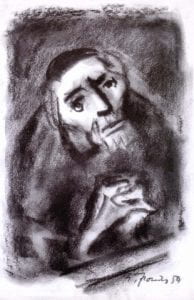 “There is no act of charity that is not accompanied by justice…”1
“There is no act of charity that is not accompanied by justice…”1
A commitment to making every effort for justice must be a pillar upon which DePaul University’s mission rests. To remind us of this, visitors to the Lincoln Park student center are welcomed by a statue of Msgr. Jack Egan, a twentieth-century priest, with the question engraved below, “What are you doing for justice?” This is not a new thread woven into an ancient tapestry. It has been an essential part of our Vincentian story since the beginning. Yes, our context today differs from that of Vincent de Paul and Louise de Marillac. However, the same basic obligation remains that binds us to uphold justice, human dignity, peace, and the common good, even in the face of great challenge.
The horrific killing of George Floyd and the protests and unrest that have followed reflect the deep pain caused by a history of racism and systemic injustice in our country. We may be searching our hearts and minds to know how best to respond. Several days ago, Fr. Memo Campuzano advised Mission & Ministry staff: “It is good to stop, identify, and name the pain, anxiety, and fear. Then find the purpose in our pain and fear…then embrace that purpose and ACT.”2
Our various actions may be different. They could include protesting in the streets or simply posting on social media. Some may donate money; some may try to educate themselves and others. We may find ourselves having difficult conversations. Hopefully, we will engage in political processes. All are called to rethink what we have been doing individually and collectively, as well as what the future can and should look like.
Doubtless there are many ways to work for justice and to try to make better a broken world. Yet, whatever these ways are they must be both personal and systemic. They must, as difficult as it may seem for some, come from a place of love. And, justice must be the pursuit. To do less would be to fail our Vincentian mission.
The brutal treatment of George Floyd by a police officer, and the protests that have followed throughout the United States, are tragic and wrenching events in and of themselves. But they are also part of a long and painful history of racial injustice in our nation. What thoughts and feelings emerge within you as you pause to reflect on these events in our history? As you identify and name them, are you able to discern a deeper purpose and are you compelled to take steps toward concrete action? How can you take these steps together with others?
1) 452, To Francois du Coudray, In Toul, 17 June 1640, CCD, 2:68.
2) Internal Mission & Ministry email, 2 June 2020.
Reflection by:
Tom Judge, Chaplain, Division of Mission and Ministry
Well said Tom Judge. We can’t stand still – our leader has invited all in Athletics to be change agents.
We all live on one Earth, under one sun, and each of us cast a black shadow.
When we walk on a bright, sunny day our shadows follow us and our shadows are black. At least we all have that in common.
I am so relieved, proud, comforted that my daughter attends this school. You walk your talk. When the pandemic broke out, you took care of your students and staff. And now, with so much unrest, you ask, “What are you doing for justice?” Whether it be speaking out, marching, donating money, you’re encouraging our young people to have a voice. You implore them and empower them to be the change agents. You encourage your students to take a stand, not be bystanders. This is an excellent example of higher education for our world!